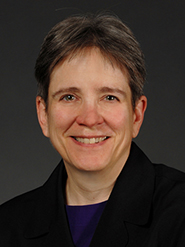
Professor of Music Lydia Hamessley presented a paper titled “Elizabethan Music in 1930s America: Paul Green’s Symphonic Drama, The Lost Colony (1937)” at the annual meeting of the American Musicological Society held Nov. 7-10 in Pittsburgh, Pa.
Included in the session “Domesticating Music in the U.S.,” Hamessley’s paper examined the use of music in Paul Green’s 1937 outdoor pageant that commemorated the 350th anniversary of the founding of the first English colony in North America. Supported by the WPA, the Civilian Conservation Corps and the Federal Theatre Project, the play has been in continual production since 1937, excluding the years during WWII.
Focusing on the redemptive power of the New World, Green asserts the English identity of Americans. Thus, its music is an amalgamation of Elizabethan hymns, carols, ballads and ballets; liturgical music of Byrd, Tallis and Tye; well-known tunes such as “Greensleeves,” “Agincourt” and “All in a Garden Green;” and incidental music written by composer Lamar Stringfield.
Green wrote The Lost Colony and shaped the musical score at a time when composers and musicians sought to identify a distinctly American style, looking especially to folk music. Green participated in this political/cultural debate stating, “the old English music [in The Lost Colony is] the folk song and hymn tunes of our musical heritage.” Green’s choices of “authentic” Elizabethan music were also made against the backdrop of the burgeoning Early Music movement.
In her paper Hamessley argued that the early score of The Lost Colony influenced both musical projects and that it embodies an underlying connection between the two. The paper was informed by Hamessley’s examination of materials held in the Lost Colony archives at the Roanoke Island Historical Association in Manteo, N.C., as well as the Paul Green papers held in the Southern Historical Collection at the University of North Carolina at Chapel Hill.
